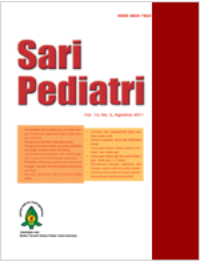Penggunaan Granulocyte Colony-Stimulating Factor pada Pasien Tumor Padat yang Mengalami Neutropenia
Sari
Infeksi yang terkait dengan neutropenia pasca kemoterapi merupakan salah satu penyebab morbiditas dan
mortalitas yang cukup sering pada pasien kanker. Neutropenia pasca kemoterapi selain akan memperpanjang
lama rawat dan meningkatkan risiko infeksi, juga menyebabkan tertundanya pemberian kemoterapi dan
pengurangan dosis kemoterapi. Hal ini secara tidak langsung akan mempengaruhi kesintasan pasien.
Hematopoietic growth-stimulating factor adalah sitokin yang mengatur proliferasi, diferensiasi
dan fungsi sel hematopoietik. Penggunaan granulocyte colony-stimulating factor (G-CSF) dan granulocytemacrophage
colony-stimulating foctor(GM-CSF) saat ini banyak diteliti pada pasien kanker yang berisiko
mengalami neutropenia. Pemberian G-CSF pada manusia menyebabkan peningkatan neutrofil yang
bersirkulasi karena berkurangnya masa transit dari sel induk menjadi neutrofil matur, oleh karenanya
zat ini sering dipakai untuk mengatasi neutropenia. Tujuan penulisan untuk mengetahui kegunaanya
pada pasien tumor padat yang mengalami neutropenia.
Kata Kunci
Teks Lengkap:
PDFReferensi
Pascoe J, Cullen M. The prevention of febrile neutropenia.
Curr Opin Oncol 2006;18:325-9.
White N, Maxwell C, Michelson J, Bedell C. Protocols for
managing chemotherapy-induced neutropenia in clinical
oncology practices. Cancer Nursing 2005;28:62-9.
Raposo CG, Marin AP, Baron MG. Colony-stimulating
factors: Clinical evidence for treatment and prophylaxis
of chemotherapy-induced febrile neutropenia. Clin
Transl Oncol 2006;8:729-34.
Kaushansky K. Lineage-spesific hematopoietic growth
factors. N Engl J Med 2006;354:2034-45.
Oxford Centre of Evidence-based Medicine. Oxford
Centre for evidence-based medicine levels of evidence
(March 2009). Diunduh dari: http://www.cebm.net/index.
asox?o=1025. Diakses tanggal 22 Juli 2009.
Garcia-Carbonero R, Mayordomo JI, Tornamira MV,
Lopez-Brea M, Rueda A, Guillem V, dkk. Granulocyte
colony-stimulating factor in the treatment of high risk
febrile neutropenia: A multicenter randomized trial. J
Natl Cancer Inst 2001;93:31-8.
Hartmann LC, Tschetter LK, Habermann TM, Ebbert
LP, Johnson PS, Mailliard, dkk. Granulocyte colonystimulating
factor in severe chemotherapy induced
afebrile neutropenia. N Engl J Med 1997;336:1776-
Maher DW, Lieschke GJ, Green M, Bishop J, Stuart-
Harris R, Wolf M, dkk. Filgrastim in patients with
chemotherapy-induced febrile neutropenia. Ann Intern
Med 1994;121:492-501
Mitchell PLR, Marland B, Stevens MCG, Dick G, Easlea
D, Meyer LC. Granulocyte colony-stimulating factor in
established febrile neutropenia: A randomized study in
pediatric patients. J Clin Oncol 1997;15:1163-70.
Ozkaynak MF, Krailo M, Chen Z, Feusner J. Randomized
comparison of antibiotics with and without granulocyte
colony-stimulating factor in children with chemotherapyinduced
febrile neutropenia: A report from the children’s
oncology group. Pediatr Blood Cancer 2005;45:274-
Riikonen P, Saarinen UM, Makipernaa A, Hovi L,
Komulainen A, Pihkala J, dkk. Recombinant human
granulocye-macrophage colony-stimulating factor in
the treatment of febrile neutropenia: a double blind
placebo-controlled study in children. Pediatr Infect Dis
;13:197-202
Vellenga E, Uyl-de Groot CA, de Wit R, Keizer HJ,
Lowenberg B, ten Haaft MA, dkk. Randomized placebocontrolled
trial of granulocyte-macrophage colonystimulating
factor in patients with chemotherapy-related
febrile neutropenia. J Clin Oncol 1996;14:619-27.
Dubois RW, Pinto LA, Bernal M, Badamgarav E, Lyman
GH. Benefits of GM-CSF versus plasebo or G-CSF
in reducing chemotherapy-induced complications: A
systematic review of the literature. Supportive Cancer
Therapy 2004;2:34-41.
Berghmans T, Paesmans T, Lafitte JJ, Mascaux C, Meert
AP, Jacquy C, dkk. Therapeutic use of granulocyte and
granulocyte-macrophage colony-stimulating factors in
febrile neutropenic cancer patients. Support Care Cancer
;10:181-8
Clark OAC, Lyman G, Castro AA, Clark LGO,
Djulbegovic B. Colony stimulating factors for
chemotherapy induced febrile neutropenia. Cochrane
Database Syst Rev 2009;3:CD003039
Schwartzberg LS. Neutropenia: Etiology and pathogenesis.
Clinical Cornerstone 2006;8 (Suppl5):S5-11.
Smith TJ, Khatcheressian J, Lyman GH, Ozer H,
Armitage JO, Balducci L, dkk. 2006 update of
recommendations for the use of white blood cell growth
factors: An evidence-based clinical practice guideline. J
Clin Oncol 2006;24:3187-205.
DOI: http://dx.doi.org/10.14238/sp11.6.2010.428-33
Refbacks
- Saat ini tidak ada refbacks.
##submission.copyrightStatement##
##submission.license.cc.by-nc-sa4.footer##
Email: editorial [at] saripediatri.org


Sari Pediatri diterbitkan oleh Badan Penerbit Ikatan Dokter Anak Indonesia
Ciptaan disebarluaskan di bawah Lisensi Creative Commons Atribusi-NonKomersial-BerbagiSerupa 4.0 Internasional.




